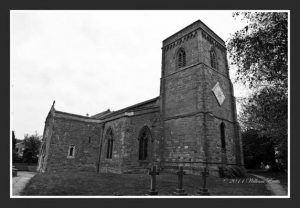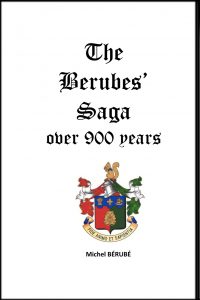It’s possible to question ourselves about ancient bearers of the name Beruby, among whom may be found one of our most distant ancestors, one that the traditional genealogy could not flush out. We will deal here of Pagen, a good example.
In 1086 appears in the Domesday Book the following extract:

Some translations have been made of it including one by Stuart A Moore :

The name Pagen comes from the Latin Paganus corresponding to the word païen in French. The master of this place may have deserved his nickname because he was not to zealous regarding religion or, more probably, because he came from a part of Normandy, surely the west side of the duchy, where one Christianised less quickly. It may also be because he was a foreigner, foreigners often being called pagans. William the Conqueror had for instance recruited Germans for the invasion of England and also some pagans from the Cotentin[i].
Now, our Y-DNA allows us to believe that our remote ancestors once lived, without specifying in what era, in northern Germany, a region that once belonged to Denmark, about one thousand years ago, but that was inhabited by Saxons and neighbouring the country of the Frisians, ancestors of the Dutch. Nothing is sure, but it is clear that certain newcomers in Normandy, officially created in 911, were coming from this area. Our ancestor could also come from Pomerania located further east, in fact the south shore of the Baltic Sea, where Northern Germans mixed with Slavs a lot while belonging to the Dane Kingdom for some time.
Pagen (or a son of him), who lived in Berchebi, could have been the first one who was designated as coming from Beruby, the spelling of this name being used very soon under the Normans’ reign (around 1120). He is the owner of two « hides » (an English measure) obtained from King William, William the Conqueror himself. One hide is normally enough to provide sufficient supplies to the Lord, his family and his dependants. It is therefore a small domain.
This one covers five « car. » of arable land, which represents five acres in this case, according to Moore. There are two lands with a serf on each one, a kind of farmer placed under the authority of Pagen, ten villains (slaves belonging to Pagen) and eight bordars (this word bordar corresponding to a peasant whose status is a little better than for a slave) working on the remaining three acres. There is also six acres of meadows. According to Encyclopedia Britannica, the Anglo-Saxon acre was defined as a strip of land 1 × 1/10 furlong or 40 × 4 rods (660 × 66 feet). One acre gradually came to denote a piece of land of any shape measuring the present 4,840 square yards. There is finally a forest of six perches (one perch = 5 m or 16 feet) long in width.

St. Mary’s Church from Barby (once Beruby), Northamptonshire, dating from the Middle Age (13th or 14th centuries), at a time when some Berubys lived in the area. One of our ancestor may have been there, who knows?[ii]
Identified to Pagen, the local landlord, these properties in 1086 belong to William Peverel (Guillaume Peuerel c.1040-1115), the only presumed bastard of William the Conqueror, who gave him many domains. Peverel is the « tenant-in-chief », a title that places him above the local landlord. A knight born in Normandy, this William would have participated to the battle of Hastings in 1066, as well as Ranulph Peverel, a Flemish knight who married his mother and from whom he took his name. It is worth noting that the Domesday Book also identifies this William as one of those who built castles in England, a collection of buildings known as the « Honour of Peverel ».
We have to interest ourselves in Pagen, a small lord protected par the Norman authorities, living in a place that was named Beruby around 1120. Though surnames do not exist yet, it is probable that his descendants were also known, as early as the 12th century, as coming from Beruby.
Surnames rather appeared during the 13th century. We find very soon during this century important people named de Beruby, for instance Samson, Prior of Saint-Andrew in Northampton, mentioned as soon as 1220 in an official document in Latin as being from Berchebi, that Normans already named Beruby since almost a century. I think also of other landlords of the shire, for instance Simon de Berughby, traced back to 1240, whose descendants also write their name Beruby. There is also John de Beruby, attorney in 1280, in the neighbouring village of Daventry. In my opinion, Adam de Berruby, present in Dublin in 1263-64, probably came from the same area, as well as another Adam who was the owner of a land in Daventry in 1323. William de Beruby who founded a coal mine in Shippen, in the west riding of Yorkshire[iii], in 1262, was married to a Walcote, a name coming from a neighbouring county in the Midlands. As for Hugh Beruby living in Anglesey in 1337, in the north of Wales, there may be a link with Hugh, who inherited half a fief from Simon in 1285, which passes later, in 1314, to John and Robert Beruby.
If the name Beruby only became a surname in the beginning of the 13th century, this leaves a gap of more than a century from Pagen, certainly three generations. Considering the social rank of the first Berubys from the area, there is nevertheless a motive here to ask ourselves if the Berubys of Northampton County could descend from this little Lord. The rank occupied by those Berubys gives some weight to this hypothesis, though it remains only a hypothesis. There are more chances that they descend from the first lord de Beruby than one of his serfs, villains or bordars living under his authority. But, it is also possible that Pagen died without a descendant, or was otherwise chased from there, and that the Berubys come from a successor appointed by William Peverel.
This domain will later become the « Manor of Beruby » and will belong to Sancha de Provence, sister-in-law of King Henry III, and to the Zouches, a family Of Breton origin, from father to son, the barons of Haringworth and even an archbishop of York. There was at least one Beruby (written Berwby) who was close enough to the Zouches to be an inheritor of William, third baron of Haringworth, in 1381. John Berowby, maybe the same individual, was also, in 1397, testamentary executor of Richard, brother of the baron, who had fought in France and lived in Calais. In 1418, Guillaume (William) La Zouche, Lord of Haringworth, participated to the siege of Rouen while he was already governor of Calais. This is a good reason to ask ourselves if he had not taken a Beruby with him, or if one Berube did take advantage of his relation with this Zouche family to get some benefits from the capture of Rouen, in 1420. This was offering a nice opportunity to settle elsewhere while the English economy was still stagnant following the prolonged effects of the 14th century epidemics.
This being said, our association motto begins with the words « With Faith,…. ». Could it be nevertheless that we are descending from a Pagen ?
Michel Bérubé, #0338
President of the AFB
Published in the fall of 2013 and revised in May 2018
[i] Some pagans from the Cotentin were descendants of Vikings from Jomsburg or Jomsvikings, mercenaries trained in Pomerania, on an island located near Poland, who had participated to the conquest of England by Knut (Knud in Danish) the Great, in 1016, before being chased away by him.
[ii] A photo published with the authorization of Mr. William Evitts, born in Barby from an old family whose origin goes back to the 16th century. Mr. Evitts has been living in Saskatchewan for more than 35 years.
[iii] I thought for a while that the Berubys from Yorkshire were not related to those of the Midlands. But King William didn’t want his barons to be the master of a homogeneous territory. So the fiefs he gave them could be located in very different areas of the country. The Zouche and Cantilupe families who successively possessed the Manor of Beruby in the Midlands had also fiefs in Yorkshire where they could have moved some vassals or right-hand men. Consequently, some Berubys of the North could perfectly be related to Berubys who first appeared in the surrounding of the Manor of Beruby.

